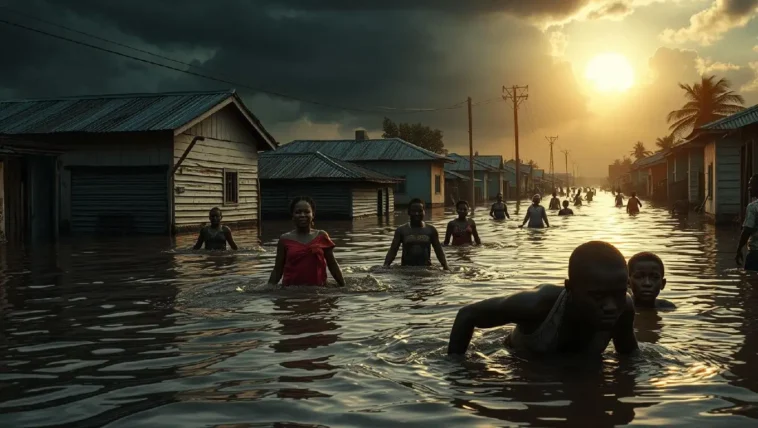Kebbi Floods
Urgent! Devastating Kebbi Floods Impact Thousands
Kebbi Floods have caused widespread devastation, displacing thousands and highlighting the urgent need for disaster relief.Kebbi State Grapples with Unprecedented Flood Disaster: Thousands Displaced
The relentless downpour turned the landscape of Kebbi State into a vast, unforgiving ocean. Homes, farms, and livelihoods were submerged as the floodwaters surged, leaving a trail of devastation in their wake. The year 2024 will forever be etched in the memories of Kebbi residents as the year the heavens opened, and their world was turned upside down.
Naija NewsBurrow Network has confirmed that the scale of this disaster is unprecedented, with entire communities displaced and struggling to cope with the loss of everything they hold dear. The question on everyone’s lips: how did it get this bad, and what can be done to prevent such catastrophes in the future?
The Rising Tide: A State Under Water
The numbers paint a grim picture. According to the latest reports, over 280,000 individuals, representing more than 54,000 households, have been directly affected by the floods. That’s a staggering number – a significant portion of Kebbi’s population now rendered vulnerable and in dire need of assistance. Imagine the sheer scale of displacement, the countless stories of loss, and the overwhelming sense of despair that hangs heavy in the air.
Across 18 local government areas, the floods have left a trail of destruction. From Argungu to Birnin Kebbi, no community has been spared. The human cost is immeasurable, with families torn apart and futures hanging in the balance. One survivor, a local farmer named Alhaji Musa, recounted how he watched helplessly as his entire farm was swallowed by the floodwaters. “Everything I worked for, gone in a matter of hours,” he lamented, his voice filled with anguish. “What will we eat? How will we survive?”
The situation is further compounded by the fact that many residents are now facing a double whammy: the loss of their homes and their primary source of income. With over 66,000 people displaced and countless others stranded in their communities, the need for shelter, food, and medical assistance is growing more critical by the hour.
From Fields of Green to a Watery Grave: Agriculture Devastated
Kebbi State is known as the “food basket” of Nigeria, its fertile lands providing sustenance for the nation. But the floods have turned this breadbasket into a watery grave, crippling the agricultural sector and threatening food security across the region. With 93% of the assessed locations relying on crop and vegetable farming as their primary source of income, the impact of this disaster cannot be overstated.
The images are heart-wrenching: vast stretches of farmland submerged, crops rotting in the fields, and livestock swept away by the raging currents. Farmers, who once prided themselves on their ability to feed their families and contribute to the nation’s economy, are now left with nothing. The economic consequences are dire, with local markets disrupted, food prices soaring, and the threat of widespread hunger looming large.
The loss of these crops will have a ripple effect, impacting not only the farmers themselves but also the countless individuals who depend on them for their livelihoods. Traders, transporters, and consumers will all feel the pinch as the scarcity of food drives up prices and exacerbates existing economic challenges. The road to recovery will be long and arduous, requiring a concerted effort from both the government and the international community.
NEMA Steps In: A Race Against Time to Deliver Relief
In the face of this unfolding tragedy, the National Emergency Management Agency (NEMA) has stepped in to provide much-needed relief to the flood victims. Distributing food and essential items across 13 LGAs, NEMA is working tirelessly to alleviate the suffering of those affected. But the scale of the disaster is immense, and the agency faces a daunting task in reaching all those in need.
Rice, beans, maize, vegetable oil, seasoning, pasta, salt, mosquito nets, blankets, and nylon mats – these are the basic necessities that NEMA is providing to help flood victims survive. But these items are just a drop in the ocean compared to the overwhelming needs of the affected communities. Many families have lost everything, including their homes, clothing, and personal belongings. The psychological trauma of such loss is immeasurable, and the road to recovery will be long and challenging.
While NEMA’s efforts are commendable, there are concerns about the efficiency and effectiveness of the distribution process. Some victims have complained about delays in receiving aid, while others have raised concerns about the quality and quantity of the items being provided. It is crucial that NEMA addresses these concerns and ensures that aid reaches those who need it most, without discrimination or favoritism.
Kebbi’s Bold Plan: Can “Residual Moisture” Farming Save the Day?
Amidst the despair, a glimmer of hope emerges from the Kebbi State Government’s innovative flood recovery scheme. Focusing on “residual moisture crop production,” this initiative aims to leverage the post-flood conditions to boost agriculture and ensure food security. It’s a bold and ambitious plan, but can it deliver on its promise?
The scheme provides support to over 16,000 farmers, offering them free improved seeds, fertilizers, and chemicals. These are high-quality seeds specifically tailored for optimal growth in post-flood conditions, including maize, potatoes, and cassava. The government is also providing irrigation support, supplying pumping machines and training on efficient irrigation techniques. The goal is to help farmers quickly replant their fields and salvage what they can from the disaster.
However, some experts have raised concerns about the sustainability of this approach. They argue that relying solely on “residual moisture” may not be enough to ensure long-term agricultural productivity. They also point out the need for more comprehensive water management strategies to prevent future flooding and mitigate its impact. Despite these concerns, the flood recovery scheme represents a crucial step in helping Kebbi’s farmers get back on their feet and rebuild their livelihoods.
Planting Hope: The Crops That Could Revive Kebbi
Maize, potatoes, and cassava – these are the crops at the heart of Kebbi’s flood recovery efforts. Chosen for their ability to thrive in post-flood conditions, these crops represent a lifeline for farmers struggling to recover from the disaster. But what makes these crops so special, and can they truly deliver on their promise?
Maize is a staple food in Nigeria, providing sustenance for millions. It’s also a relatively quick-growing crop, making it ideal for planting in the aftermath of the floods. Potatoes are another versatile crop that can be grown in a variety of conditions. They’re also a good source of carbohydrates and other essential nutrients. Cassava is a drought-resistant crop that can tolerate poor soil conditions. It’s also a good source of carbohydrates and can be processed into a variety of food products.
The success of these crops will depend on a number of factors, including the availability of water, the quality of the soil, and the effectiveness of the irrigation techniques being used. Farmers will also need access to proper training and support to ensure they can maximize their yields. If all goes well, these crops could provide a much-needed boost to Kebbi’s agricultural sector and help ensure food security for the region.
Watering the Future: Irrigation as a Tool for Empowerment
In a region where water can be both a source of life and a force of destruction, irrigation plays a crucial role in Kebbi’s flood recovery efforts. By providing farmers with pumping machines and training on efficient irrigation techniques, the government is empowering them to take control of their livelihoods and build a more resilient future.
Irrigation allows farmers to cultivate their crops even when rainfall is scarce. It also helps to improve soil quality and prevent erosion. By using efficient irrigation techniques, farmers can conserve water and reduce their reliance on unpredictable weather patterns. This is particularly important in the context of climate change, where extreme weather events are becoming more frequent and intense.
The provision of pumping machines is a game-changer for many farmers who previously relied on manual labor to irrigate their fields. These machines allow them to water their crops more quickly and efficiently, freeing up time for other tasks. The training on efficient irrigation techniques is also crucial, as it helps farmers to use water more effectively and minimize waste.
Beyond the Banks: Climate Change and Kebbi’s Looming Crisis
The floods in Kebbi State are not an isolated event. They are part of a larger pattern of flooding events in Nigeria, exacerbated by climate change and anthropogenic activities. As global temperatures rise and weather patterns become more erratic, communities like Kebbi are increasingly vulnerable to the devastating impacts of extreme weather events. It’s a wake-up call that demands urgent action.
Climate change is causing more intense rainfall, leading to more frequent and severe flooding. Deforestation, poor land management practices, and inadequate drainage systems are also contributing to the problem. In order to protect communities like Kebbi, it is crucial to address the underlying causes of climate change and invest in sustainable development practices.
This includes reducing greenhouse gas emissions, promoting renewable energy, and implementing effective water management strategies. It also requires empowering local communities to adapt to the changing climate and build their resilience to future disasters. The time to act is now, before it’s too late.
Poverty’s Grip: Floods Fuel a Cycle of Despair
The floods in Kebbi State have not only caused physical destruction but have also exacerbated the existing problem of multidimensional poverty. With livelihoods destroyed and homes washed away, many families are now trapped in a cycle of despair. Social assistance programs are struggling to keep up with the growing needs of the affected population.
Multidimensional poverty refers to the interconnected deprivations that people experience, including lack of access to education, healthcare, and basic services. The floods have made these deprivations even more severe, pushing vulnerable communities further to the margins. Children are being forced to drop out of school, families are struggling to access healthcare, and basic sanitation is becoming a luxury.
To break this cycle of poverty, it is crucial to provide comprehensive support to flood-affected communities. This includes not only providing immediate relief but also investing in long-term development initiatives. Education, healthcare, and job creation are essential for empowering people to rebuild their lives and create a more prosperous future.
Rising from the Waters: A Future For Kebbi
The road to recovery will be long and arduous, but the people of Kebbi are resilient. They have faced adversity before, and they will overcome this challenge as well. With the support of the government, the international community, and each other, they will rebuild their lives and create a brighter future for their children.
The floods in Kebbi State serve as a stark reminder of the urgent need to address climate change and invest in disaster preparedness. By working together, we can protect vulnerable communities from the devastating impacts of extreme weather events and build a more sustainable and equitable world.
Naija NewsBurrow Network encourages all its readers to support the relief efforts in Kebbi State. Every contribution, no matter how small, can make a difference in the lives of those affected by this disaster. Together, we can help Kebbi rise from the waters and build a more resilient future. Let’s show the world that Nigeria stands united in the face of adversity. Share your thoughts and opinions in the comments below, and let’s start a conversation about how we can create a more sustainable and equitable future for all.
Amara Okoye: (@AmaraReports)
As the floodwaters recede in Kebbi State, the true extent of the devastation becomes painfully clear. Beyond the immediate need for food and shelter, families face the daunting task of rebuilding their lives from scratch. Homes have been destroyed, livelihoods shattered, and communities left reeling from the impact of this unprecedented disaster. The spirit of resilience is strong, but the challenges are immense, and the road to recovery will be long and arduous.
In times like these, practical support can make all the difference. From essential supplies to tools for rebuilding, there are many ways to lend a helping hand. If you’re looking for ways to contribute to the recovery efforts, consider exploring the selection of emergency relief supplies available through our affiliate partners. Every purchase you make can provide vital assistance to those who have lost everything. Explore our curated list of essential items that can make a real difference in the lives of those affected. Join the conversation, share your thoughts, and subscribe to the Naija NewsBurrow newsletter for continuous updates and opportunities to support communities in need.
Shop Products On Amazon
Shop Products on Ebay









Trending Similar Stories in the News
Nigeria: Joint Post-Flood Situation Report - Kebbi State (30 September 2024) ReliefWeb...
Boosting Post-flood Farming Through ‘Residual Moisture Crop Production’ In Kebbi News Agency of Nigeria...
Trending Videos of Kebbi Floods
NEMA Donates Relief Items To Kebbi Flood Victims 03/10/15
Similar Popular Articles
#KebbiFloods #NigeriaFloods #DisasterRelief #HumanitarianAid #FloodVictims
Kebbi Floods, Nigeria Floods, Disaster Relief






Urgent! Devastating Kebbi Floods Impact Thousands
💬 What’s your take? Drop a comment below! ⬇️
#BreakingNews #LatestUpdate #StayInformed
📖 Read More: https://tinyurl.com/26jsyo4d